- Home
- Randall Farmer
Once We Were Human (The Commander Book 1) Page 3
Once We Were Human (The Commander Book 1) Read online
Page 3
The guards hadn’t removed my shackles, but they had done something to them to increase the slack. They gave me a new hospital smock to wear, cut to go around the shackles. I changed and went to the bathroom (down the hall, second left), escorted by armed orderlies. If you ever want a challenge, try going to the bathroom in heavy shackles.
All alone in my room, my mind turned to better things. My old life. My daughter.
I cried.
I was born in Macon, Georgia, a simple town girl, named for my great aunt Carol. My maiden name was Stevens. My father lost his dry goods store in the middle thirties, blamed the Republicans, and moved his family to Missouri. I don’t remember ever having a Deep South buttery molasses accent, but my mother Eunice did, a constant joy to listen to. Ann, my older sister, always fought with Mom, and our younger brother, Jeff, always fought with Dad. I was the good kid, the saintly middle child; I got along with everyone.
My childhood memories centered on our home in Pilot Grove, Missouri. Dad, or Old Jeff as everyone in town called him, bought himself another dry goods store in the early forties, which later became a combination feed store and small town grocery. I was exceptional in school, and much to the chagrin of my siblings graduated as Valedictorian from Pilot Grove Normal. With Mom’s blessing and Dad’s mute acceptance, I went off to college in the middle of the Korean War. The ivy halls of Iowa State were filled with men when I arrived, ever more so in the following years due to the GI Bill, a tidal wave of older men who had been through World War II, ready to make a new life of their own. Younger men returning from Korea soon joined them. I majored in history and never got a bad grade. My dorm friends and I were all studious, save when we were dating, which we did as a group as often we could.
In my third year of college, I met Bill Hancock, a new freshman. Wounded in the Korean War, he had finished his long military service career. Bill was five years older than I was, bright, witty, and driven. He knew what he wanted from life. Later, I would realize how much he resembled Dad, not physically, but in attitude and interests. Business was Bill’s life. He liked nothing better than to make a sale and close a deal. He wanted to be more than a salesman, though; he wanted to start a business, build it, and make it successful. Bill was in college to learn how to do so.
I didn’t finish my junior year at Iowa State. Bill set his sights on me, won my heart, swept me off my feet, and sold me on his vision of the future. Wife. Mother. Homemaker. The works. I was no looker, not even close. I had no sense of fashion and my appearance had never been a top priority. My dream had been to teach at a women’s college somewhere, a dowdy academic spinster. My time in college had shown me one thing, though: I was one of those people who found changing light bulbs a challenge. My family had taken care of me and I never had to learn much about the work-a-day world of houses, cars and gardens. Bill’s presence reminded me that I needed someone to care for me, at least for the physical things of life.
Mom and Dad approved of Bill, a pleasant surprise, as they had frowned at both my siblings’ choices. He sold them on his dreams as well. A June bride, I had a house of my own by the end of summer, thanks to the vacuum cleaners Bill sold on his summer vacation.
The next decade flew by fast. Two miscarriages, then Sarah. I learned to cook and keep house, although it became clear after awhile that I needed a maid for certain things. I put work into cooking, though, becoming an excellent cook. After college Bill started up a dry cleaning chain and later took it national. We were never rich but we were never poor, either. I expected to be rich by the time I had grandchildren. We entertained constantly and my cooking expertise was an essential ingredient to the sales made during our parties.
One of the last things I remembered about my former life was my daughter Sarah’s big birthday party as she turned twelve. She spent the first part of the summer helping me with the Jefferson City Library Volunteers and had won them over with her warm smile. Mom came up from Pilot Grove and she entertained the birthday party with her rich accent and elegant southern charm, telling stories about her childhood as well as stories about her fabled sister Bea, now a fine upstanding and refined Dallas lady.
If my memory wasn’t playing tricks on me, Sarah had been twelve, Billy was ten, and little Jeffrey was seven. I was Vice-President of the Jefferson City PTA, Chairwoman of the Jefferson City Library Volunteers, and Secretary of the Jefferson City Junior League. Hundreds of people knew me by name. I had dozens of friends. Jane, the second wife of our district’s City Councilman, was one of my closest friends. I was popular, a social success, a good woman.
Never, in my wildest dreams, did I ever imagine I would find myself a Transform.
---
Breakfast finally came at seven-fifteen in the morning, after I spent a very hungry night pestering the nurses for extra food they couldn’t legally give me. Standard Transform rations were larger than I expected; the breakfast included a large stack of pancakes, four rashers of bacon, a large mug of orange juice, and toast. I finished the meal hungry. I still wore the shackles, and as much of the meal ended up on the floor as in me.
“Good appetizer,” I said to the nurse. “I’m ready for the main course now.”
The nurse frowned and shook her head. She didn’t appreciate my humor. “I can’t give you anything more. I shouldn’t have given you anything last night. Dr. Peterson left specific orders. Anything, absolutely anything out of the ordinary, has to be approved by him first. He’ll be coming in this morning, and you can talk to him then. You aren’t going to starve to death in a day.”
“I’m starving to death right now,” I said, half in jest, still very hungry. The nurse ignored me.
I checked the clock every five minutes as I waited. At nine-oh-five, I heard footsteps in the hall and several low male voices. I sat up straight as Dr. Peterson stuck his head in my room. He nodded at me and stepped in. Three men followed him, and a woman.
“Good morning, Carol,” Dr. Peterson said. “I have some people who would like to talk to you. This is Dr. Henry Zielinski, one of the nation’s top researchers in the field of major transformations, and this is Special Agent Bates of the Federal Bureau of Investigation.”
I nodded to them, though the presence of an FBI agent sent shivers up my spine. Dr. Peterson didn’t introduce the third man, one of the Center’s orderlies, or the woman, a nurse.
“Good morning, Mrs. Hancock,” Dr. Zielinski said. Dr. Zielinski was medium height and balding, fiftyish, thin, his dark brown hair salted with gray. His deeply creased well-worn face didn’t match his surname; like some older French gentleman he had a narrow face with a high forehead. He projected an air of competence and wore a white lab coat over his starched white shirt, suit pants, vest and expensive Italian silk tie. He spoke with a noticeable New England Yankee accent. “Before we speak, I’d like to look at your chart,” Dr. Zielinski said. Dr. Peterson rushed over to the foot of my bed and, almost fawning, presented Dr. Zielinski with my chart.
“While Hank here deals with things medical, I’ll start things off,” the FBI man said. “Mrs. Hancock, I’m not here to investigate or harass you. I’m here as your friend.” He turned to Dr. Peterson. “Why don’t we start by removing her shackles? We won’t need them.”
“Agent Bates, she’s quite dangerous, and…” Dr. Peterson said. Bates interrupted him.
“I believe we can count on your perimeter security, Dr. Peterson. However, I’ll have to have a few words with your Chief of Security, whoever that is. Later.”
“Dr. Manigault, the Director of the Center, personally handles all security arrangements,” Dr. Peterson said, agitated.
“I see.” Bates turned back to me. “In any event, remove the shackles, please.” Dr. Peterson whispered to the orderly, gave him a set of keys, and the shackles were removed. I took a heartfelt breath of relief and rubbed my sore wrists. I smelled bacon on the orderly’s white coat and my stomach rumbled with hunger.
Dr. Zielinski looked up from my charts. “It state
s here that she attempted to escape, but doesn’t list the details.”
“She panicked during the transfer from State authorities to Center authorities,” Dr. Peterson said. He didn’t mention his own role in that debacle. “Two killed, five wounded.”
I hadn’t known. I was in such trouble…
“Let me guess,” Dr. Zielinski said. “She panicked, ran through a wall of state troopers, and they tried to shoot her on the way by. They probably hit her, too, but didn’t get in any lucky shots.” He rolled his eyes. This Dr. Zielinski actually rolled his eyes when talking about a situation where two state troopers died and five were wounded. Six wounded, if you counted me. He was so arrogant he was likeable.
Dr. Peterson silently nodded. Agent Bates shook his head. Dr. Zielinski went back to reading my chart.
“My wife is a Transform, Mrs. Hancock,” Agent Bates said. Oh. “A Transform woman, in the care of a Focus. I belong to a minority of people who believe that Transforms need protection, not protecting from. I’m here to answer any questions you may have about your new legal status as a Transform, to educate you on how to survive as a Transform, and, if all goes well, to offer you a job, a new career.”
“You’ve got to be kidding,” I said. Me, an FBI agent? In cahoots with a bunch of Communists who thought Transforms were ordinary folk, not some kind of unnatural abomination? Insane.
Mr. Bates was a tall man, about Dr. Zielinski’s age, dressed in a dark blue suit, dark tie and white shirt. He reeked of cigarette smoke. I pegged him at about six foot three, a hundred and seventy pounds. A walking cadaver, complete with sunken cheeks. He had white blonde hair cropped short and it was starting to gray. He spoke with a muted western drawl and his eyes were always on the move.
“We can talk about this later, once you get more acclimated to your status as a Transform,” Mr. Bates said. “Until then, understand that I’m here to help.”
“I’m hungry,” I said. If he wanted to help, he could start by getting me food.
“Mrs. Hancock!” That was from the nurse, Callahan. She must have caught an earful about my behavior last night.
Dr. Zielinski raised his eyebrows high and turned to Dr. Peterson and the nurse. “You had no way of knowing, but a Transform such as Mrs. Hancock needs a great deal more food than even a Focus. Nurse Callahan, I want you to go down to the kitchen and have them send up three more ‘standard breakfasts’. I want you to come back up here immediately with a full quart bottle of orange juice.” Callahan left without batting an eyelash.
Three more standard breakfasts. I was in love. Tears leaked slowly out of the corners of my eyes. I cried from the misery of the night before, from pain, fear, hunger and for those I had killed. In a moment, it all came out in wrenching sobs.
“What’s her juice reading?” Dr. Zielinski said, with a glare at Dr. Peterson. My muzzy mind thought he meant orange juice again, before I realized he meant Transforms’ juice.
“118, as of yesterday evening.”
Dr. Zielinski and Agent Bates glanced at each other. “Right,” Bates said. “The healing. This is going to change things. I’ll get right on it.” Dr. Zielinski nodded to him and Bates hurried out.
I let myself fall back onto the bed, curled up into a fetal position, and wept, face in my hands. I needed Bill, needed him to say he loved me, that everything would be all right.
Dr. Zielinski quietly sent Dr. Peterson and the orderly out of the room. He sat down by my bed and waited. After a few minutes, my tears diminished into occasional sniffles. Nurse Callahan slipped in, delivered the bottle of orange juice to Dr. Zielinski, and slipped out again.
“Are you up to drinking some orange juice?” Dr. Zielinski said, his voice quiet. This started up my tears again, but I sat up and took the bottle from him. I choked on it more than once as I drank, but the orange juice was the best thing I had ever tasted. After I finished I was still ravenous, but did feel better. I felt foolish for drinking the orange juice from the bottle, though. My mother would have said I acted like I was raised in a barn.
I wiped my eyes with the back of my hand and looked around for a box of Kleenex. Dr. Zielinski reached over to the nightstand next to his chair and handed me the box. He was the first person I’d met who was willing to come close to me. I blew my nose, wiped my eyes, and tried to make myself presentable again.
“I’m sorry,” I said to Dr. Zielinski, my voice hoarse from the tears. “I don’t usually look like this. I don’t usually act like this either.”
“Don’t worry about it,” he said. “New Major Transforms are never at their best. Are you still hungry?”
I nodded. My tears started to leak again.
Dr. Zielinski nodded. “We’ll do something about that. You’re going to need more food than you’re used to and you’re extra hungry because of your wounds.”
“This is because I’m a, a…” My voice choked on the word “Monster”.
“Because you’re an Arm? Yes. Your body is going to be capable doing of a lot more, but this requires more food intake.”
I shrieked in shock and surprise. “Arm? I’m an Arm?” My voice broke and I started to cry again.
Arms were some sort of rare new form of Transform. Story was, you became an Arm, you died. Save for a woman named Keaton. She escaped custody to become pretty much the top person on old J. Edger’s ten most wanted list. I thought there was an Arm in Europe and one in Canada who had also lived through their transformations, but I wasn’t sure. Keaton was the law enforcement disaster of the decade, the biggest one-woman crime spree ever, the person responsible for the terms ‘serial killer’ and ‘spree killer’. A true spawn of the Devil, a woman my preacher termed ‘the Antichrist’, her example proved the evil of all Transforms.
I shivered in sudden cold, afraid of myself.
“They didn’t tell you? Women suffering from Armenigar’s Syndrome need to buy into their treatment as soon as possible, before irrevocable problems begin,” Dr. Zielinski said.
“What’s,” sniffle, “Armenigar’s,” sniffle, “Syndrome?” I asked. “You,” sniffle, “said,” sniff, “Arm.”
“Sorry,” Dr. Zielinski said. “There are a small number of one of a kind transformations we call Sports. Armenigar was the first failed Focus found by the medical community. After Armenigar broke free from her Canadian doctors and juice-sucked four tagged Transforms, the media christened her an Arm, from her name and because of her strength. A couple years later, Mary Chesterson repeated the exact same form of failed Focus transformation and became the second Arm. She later died, but if there have been two, it’s not a Sport but a category of Transform, what we call an Armenigar Syndrome Focus. Her autopsy showed she indeed had a metacampus.”
“Oh.” Sniffle. ‘Juice-sucked’, he said, as if it was something that happened every day. All Transforms needed juice to survive. Normal women Transforms produced juice, but I already knew I wasn’t a normal woman Transform. I did know the metacampus was the little organ a Focus grew in her brain, which allowed her to magically keep the Transforms in her household alive, but I hadn’t known that Arms had one.
The good doctor wasn’t even the least bit rattled by my display. He continued as if I hadn’t interrupted. “You’re always going to be a little bit hungry. I’m not going to authorize as much food as you’ll want, but you’ll be eating a lot more than you have been. For now, I’m going to give the order for six thousand calories a day, and we’ll see how that works out.”
“Six thousand?” I asked. Calories I knew about.
“Six thousand,” he said. “You’re going to want more than that, perhaps much more. You won’t be able to eat as much as you want, but there’s no reason for you to be totally miserable with hunger, either. You’ll have to forgive the staff, here. Few people know anything at all about major transformations, and even fewer people know anything about Armenigar’s Syndrome.”
“Thank you,” I said. I rubbed at my wrists again. They still hurt from the long night in shack
les.
“I’ll talk to the Detention Center staff and see if I can convince them to back off. Arms have a bad reputation. Your escape attempt frightened everyone and they over-reacted. I’ve worked with Arms before and they’re not all mindless killers. I should be able to talk the staff down.”
“Are you going to be staying here? Are you going to be the doctor caring for me?” I asked. I took another drink from the empty bottle. I thought I saw a few drops at the bottom.
“Yes, I’ll be in charge of your case. For the moment, you’re going to be confined here. Agent Bates and I will stay and help you as long as we can.”
“So what happens now? What happens to me?”
He smiled at me. “First you eat breakfast. I’m going to look through your chart in more detail and start arranging your care. I’m also going to start you on an exercise program, as our experience shows that an Arm will be much healthier if she gets a lot of exercise. There will be some folks coming through to run tests on you. You can have visitors occasionally and we can get you magazines, books and other things.”
That sounded permanent. Fatally permanent.
“How long do I have to stay here? Will I be tried as a criminal?” I asked.
“Agent Bates can answer the latter question better than I can,” Dr. Zielinski said, with a smile. “In regard to your other question, well, there haven’t been enough Arm transformations to establish good statistics for how they progress. We’ll just have to take things as they come and hope for the best.”
Dr. Zielinski didn’t think I’d leave this Detention Center alive. I barely kept my tears from leaking down my cheeks. I’d always wondered about the expression ‘a lump in your throat’ and what it might mean. I found I couldn’t swallow without crying. A lump in my throat.
I choked out another question. “What am I supposed to do about juice?”
Dr. Zielinski looked away for an instant.
“Juice,” I insisted. “Transforms need juice, right? Where do I get it? I don’t see any Focus around here. Where do Arms get juice?”

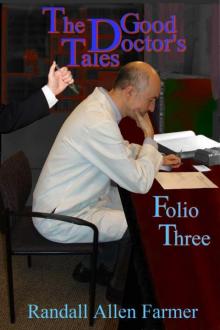 The Good Doctor's Tales Folio Three
The Good Doctor's Tales Folio Three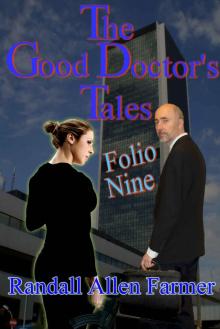 The Good Doctor's Tales Folio Nine
The Good Doctor's Tales Folio Nine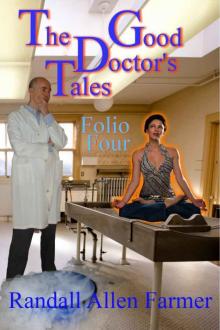 The Good Doctor's Tales Folio Four
The Good Doctor's Tales Folio Four An Age Without A Name (The Cause Book 5)
An Age Without A Name (The Cause Book 5) In this Night We Own (The Commander Book 6)
In this Night We Own (The Commander Book 6)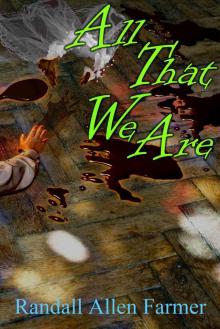 All That We Are (The Commander Book 7)
All That We Are (The Commander Book 7)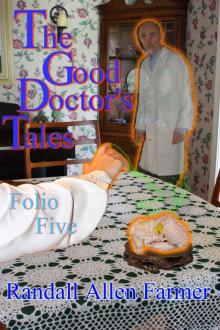 The Good Doctor's Tales Folio Five
The Good Doctor's Tales Folio Five An Age Without A Name
An Age Without A Name 99 Gods: Odysseia
99 Gods: Odysseia 99 Gods: Betrayer
99 Gods: Betrayer 99 Gods: War
99 Gods: War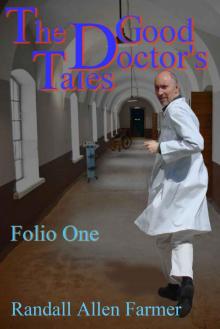 The Good Doctor's Tales Folio One
The Good Doctor's Tales Folio One The Shadow of the Progenitors: A Transforms Novel (The Cause Book 1)
The Shadow of the Progenitors: A Transforms Novel (The Cause Book 1) No Chains Shall Bind Me (The Good Doctor's Tales Folio Seven)
No Chains Shall Bind Me (The Good Doctor's Tales Folio Seven) The Forgefires of God (The Cause Book 3)
The Forgefires of God (The Cause Book 3) All Conscience Fled (The Good Doctor's Tales Folio Two)
All Conscience Fled (The Good Doctor's Tales Folio Two) No Sorrow Like Separation (The Commander Book 5)
No Sorrow Like Separation (The Commander Book 5) Beasts Ascendant: The Chronicles of the Cause, Parts One and Two
Beasts Ascendant: The Chronicles of the Cause, Parts One and Two The Good Doctor's Tales Folio Eight
The Good Doctor's Tales Folio Eight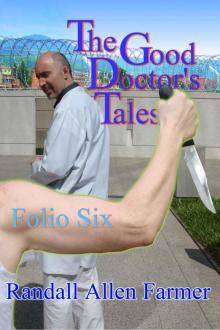 The Good Doctor's Tales Folio Six
The Good Doctor's Tales Folio Six Love and Darkness (The Cause Book 2)
Love and Darkness (The Cause Book 2)